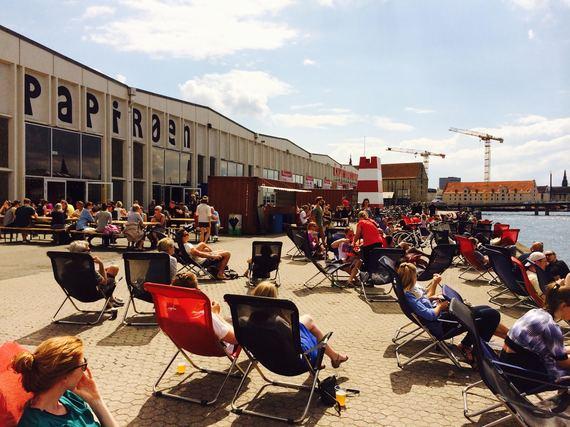CBS professor to ensure future-proof Danish ports

Copenhagen Street Food in the Port of Copenhagen. Photo: Maja Tini Jensen.
Frontpage photo: By & Havn / Ole Malling
Kissing benches, lovers piers, harbour baths and water polo have turned the attention of cities to their harbours in recent years. Kayak rentals and hyper-attractive residential areas add to the appeal of these recreational hotspots, for instance Dokk1 in the Port of Aarhus and Copenhagen Street Food in the capital.
It is also important to remember that ports are a business connecting the land and sea. Professor Peter Maskell of Copenhagen Business School (CBS) will be very involved in precisely the commercial aspect of the port sector in the future.
Ole Birk Olesen, the Danish Minister of Transport, Building and Housing, is considering revising the Danish Port Act and has appointed Maskell as the chair of a recently established expert committee that will map out the future challenges that Danish ports face, according to a press release issued by the minister.
In the following, Marskell provides insight to those unacquainted with the problems that lurk among the shipping containers, seagulls and cruise ships in Danish ports.
What significance do ports have for Denmark?
“Like all other companies no two ports are alike. Cruise ships and ferries dock at some ports while fishing boats, tankers and containers dock at others. But combined they are essential to our nation. About three-fourths of all of our foreign trade goes through Danish ports. Without ports the road system would be clogged with large lorries.”
What will your role on the expert committee be?
“We’ve been tasked with not just beating the rug, but to weave a new one. And to do that based on durable, solid economic principles that take into account legal considerations and the reality that local business and industry face. It is infinitely fascinating to be in a position where you have to cut apart the Gordian Knot. There are multiple interests and conflicts at stake.”
List of the other members of the expert committee
The committee’s work will cover all of the ports in the country, which includes everything from Aarhus, Esbjerg and Copenhagen’s Nordhavn to Randers and the Port of Lemvig. Why is it necessary to have an expert committee?
“Denmark’s ports have undergone a colossal transformation in recent years, increasing the need to update our knowledge about our ports. This includes, for instance, the impact of increasingly large ships, specialisation, investments, the division of labour and competition. It’s a universe replete with strong emotions and opposing considerations.”
What strong emotions and opposing considerations are at play?
“Large, busy ports, for example, would like to collect port traffic to better utilise economies of scale. They talk about the overcapacity of the port sector in proportion to the amount of goods. Just as it has been said that trains have too many stops compared to the amount of passengers and that there are too many mailboxes compared to the number of letters sent. The owners of smaller ports believe that this is perfectly untrue because the ports occupy such different roles. The committee will determine what is up and what is down.”
Denmark has 41 ports owned by local authorities. What impact will it have on the local authorities if one or more of the smallest ports closes its commercial maritime operations in the long run?
“For many local authorities, their ports are business hubs. The port is a card they play when they need to attract new companies and create jobs. Many ports have tremendous significance for total employment in the surrounding area. One port job supports 200 peripheral jobs, which is an absurdly high figure. As a result local authorities vulnerable to the closure of business clusters around the harbour are not the list bit enthusiastic about considering consolidation. They see it as a threat to development that will undermine the foundation for growth in rural coastal communities.”
Overview of commercial ports in Denmark
The expert committee will solely examine the commercial conditions of the ports. But can a possible revision of the Danish Port Act impact leisure activities in ports in the long term?
“If any legislative changes lead to fewer commercial ports, it will create a profusion of new opportunities for businesses in favour of kayaks, harbour baths and kissing benches. Today it’s difficult to live close to a commercial port because of the noise and there are safety issues that must be taken into account and sometimes pollution. If these factors disappear, new links between land and sea will arise, and with them, the possibility of exciting new buildings and leisure activities. Consequently, especially property investors and recreational and tourist developers lean in that direction.”
Peter Maskell works at the Department of Innovation and Organizational Economics and has many years’ experience within the maritime industry as the chair of the board of Copenhagen Malmø Port (CBP) and Danish Ports, a professional organisation. In addition to Maskell, CBS is also represented in the committee by Professor Carsten Greve.
For more information please contact:
Professor Peter Maskell
Or journalist Matilde Hørmand-Pallesen
About the expert committee
- The expert committee must submit its analysis and recommendations by the close of 2017.
- The Council for Commercial Danish Ports will represent the industry and monitor the expert committee’s work.
- The expert committee must examine whether the current Danish Port Act regulates the structure, activity and organisational form of publically own ports in a way that guarantees clarity with regard to public administration and competition law.
Source: Press release from the Minister of Transport, Building and Housing
About CBS’ maritime initiatives
The CBS Maritime platform brings together research in the maritime industry across CBS research communities.
Read more about CBS Maritime
Read about research projects
Read about degree programmes
CBS Shipping Student Network